Jun 3, 2025 11:25 AM
In Memoriam: Al Foster, 1943–2025
Al Foster, a drummer regarded for his fluency across the bebop, post-bop and funk/fusion lineages of jazz, died May 28…
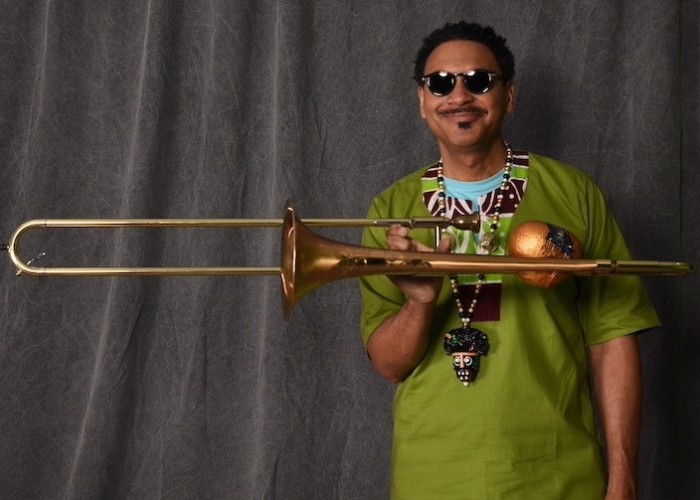
“A lot of trombone players play a lot of notes,” says Delfeayo Marsalis. “I play real laid-back.”
(Photo: Girard Mouton)The most famous brothers in jazz are scattered. Wynton lives in Manhattan. Branford settled in North Carolina. Jason moved to France for a while, then returned to New Orleans. Only Delfeayo Marsalis never left New Orleans. And he is “so New Orleans.”
That’s also the name of one of the tracks on his supremely funky new album, Uptown On Mardi Gras Day (Troubadour Jass), a celebration of all things Mardi Gras that might as well be the official album for carnival season. The album is the third from the 16-member Uptown Jazz Orchestra (UJO), which Delfeayo founded in 2008. The track “I’m So New Orleans (2023),” with music by Delfeayo and lyrics by local trumpeter Dr. Brice Miller, includes these lines, which Miller raps on the recording:
“I’m so New Orleans, we like syncopated beats with uptown grooves/ When you hear that beat, you can’t help but move” … “I’m so New Orleans, it makes me proud that Louis Armstrong was a Zulu king/ ’Cause that let me know from an early age I can do just about anything.”
Miller could be talking about Delfeayo, 57, who, since he started playing in the sixth grade, has been much more than the Marsalis family’s accomplished, eloquent trombonist. He is a bandleader, composer, arranger, prolific record producer, educator and a civic booster who heads no fewer than three nonprofits in the Big Easy.
He spoke over several Zoom sessions from the modern house he built for his wife and daughter on the border of Central City and the Lower Garden District, about a mile from where Buddy Bolden once lived. His attachment to the city was obvious. “There’s so much to love about New Orleans, I never considered leaving once I settled in,” he said.
After attending Berklee, where he double-majored in music performance and production, he spent a couple of months looking for an apartment in New York City. “But I couldn’t find a place I both liked and could afford, so I went back home. For sure, I didn’t have a plan … well, a girl might have been involved, too,” he laughed.
“Anyway, living in a former Confederate state definitely has its challenges, but … it was good to live close to my parents, and younger brothers Mboya and Jason. And I felt like I could find my calling better down here than anywhere else.”
The year is young, but the new album may turn out to be the most entertaining jazz, or at least jazz-adjacent, recording of 2023, one that you didn’t know you needed until you heard it (and danced to it). This Marsalis can play as modern as anyone, but here he doesn’t aim to challenge us intellectually or stretch the definition of jazz. Instead, he provides about 45 minutes of New Orleans struts and shuffles, originals and classic Mardi Gras tunes like “Big Chief,” played and sung by a crack band featuring soulful NOLA vocalists, from whom authenticity pours forth like perspiration, all with just one goal: to make you have a good time and forget your troubles.
Growing Up Marsalis
Delfeayo is, of course, the fourth of the six Marsalis boys born to father Ellis Marsalis Jr., and Delores Marsalis. Ellis, an elegant modern jazz pianist, educator and the most famous patriarch in jazz history, died in 2020 of COVID; Delores passed in 2017. The Marsalis family — Ellis and the four musical brothers together — were inducted as NEA Jazz Masters in 2011, the first time the NEA awarded that honor to a group.
Through eight previous, critically acclaimed albums like 1992’s Pontius Pilate’s Decision, 2006’s Minions Dominion and 2010’s Sweet Thunder, Delfeayo proved himself a skilled post-bop trombonist influenced by J.J. Johnson and Slide Hampton, among others. He has toured with Ray Charles, Art Blakey, Max Roach, Elvin Jones and Abdullah Ibrahim. He received a master’s degree in music performance from the University of Louisville and an honorary doctorate from New England College.
His famous brother Branford, the first-born, is five years older than Delfeayo. Next came Wynton (four years older). Then Ellis III, an author, photographer and computer networking consultant arrived. He now lives in Baltimore. After Delfeayo came Mboya, who is diagnosed with autism; Delfeayo keeps a brotherly eye on him in New Orleans. Jason, the highly regarded drummer and vibraphonist, is 12 years younger than Delfeayo.
In a 2004 interview with The New York Times Magazine, Wynton said that his father always led by example — expecting, rather than demanding, a high level of seriousness from his students. “My dad wasn’t opposed to my becoming a musician, but he didn’t expect it,” Delfeayo said. At first, the father wasn’t especially keen on Delfeayo’s choice of the trombone. “His vibe was, ‘Hey, man, trombone is always the third horn — or the sixth musician — hired. So if people are hiring, they’re gonna hire the piano trio first. Then it will be a saxophone; then it will be trumpet. Then trombone. So just understand, unless you’re doing your own thing, or playing traditional New Orleans music, that’s gonna be a tough row to hoe.”
Although Ellis was laid-back in approach, Delfeayo sensed the high expectations. “He was passive aggressive about it. [laughs] He would tell me five or six times, ‘Boy, you sounded great on that ballad. You ought to think about doing a ballads record.’” That was not exactly what young Delfeayo wanted to hear.
“Wynton was very influential on me. He was always playing fast — you know, the burnout. And that was something I always loved. That’s how my dad was — he would never say, ‘Man, don’t do that.’ He would be more likely to say, ‘You really can play ballads well.’ How many times did he tell me that? Oh, my goodness.
“My dad would allow you to both succeed and fail. I once did a short tour with him in California when he was in his 70s. When we played in Monterey, some youngsters were playing before us — Ambrose Akinmusire’s band. We had a set that was tailored to my dad’s strengths, not a lot of burnout stuff. We would open our set with ‘Tin Roof Blues,’ which is a slow blues. And Ambrose and his group, they were firing it up, they were shredding, as you might say. So, I’m backstage, and I’m telling my dad, ‘Man, we got to come out with some energy! We’ve gotta be fired up!’
“And he thought for a second, and he just said, ‘Seems like the program we already have set is gonna give us the best chance.’” [laughs]
“Sure enough, we came out and played ‘Tin Roof Blues,’ and the folks were just (loving it). … And I learned something that I should have known by that point: People just appreciate quality music. They don’t evaluate music the way musicians do. They were ready for something else. They didn’t want us to play another 30 minutes of what Ambrose’s band had been playing.” What his father had recommended turned out to be just right. “And I was like, damn, he got me again.”
For all the attention paid to Ellis Marsalis, however, people tend to underestimate the influence of his wife, Delores, on the brothers — and their destiny. “I was really close to my mom growing up,” Delfeayo said. “Branford and Wynton were probably closer to our father. But it was my mom who had the vision for the family. My dad, he was a musician — mainly, he wanted to play the piano. My mom wanted to have a family. She even studied home economics at Grambling State University. My dad didn’t necessarily have a plan, but he was pliable.
“I used to help [my mom] out. When my younger brother, Mboya, was born with autism, I tried to help out with him. So that kind of shifted the family dynamic.”
Delores insured that the boys had a relationship with their dad. “With homework, if we had any questions, she might know the answer, but she’d say, ‘Wait till your daddy gets home; ask him.’ For her, it was important that we had a strong relationship with our father,” he said, explaining that her own father had left when she was born, and she wanted to make sure her children had a real father.
“She did the cooking, the cleaning, the housekeeping. She made sure that everything was ironed and that we got to where we needed to on time.”
In other words, she made the house a home “for real,” Delfeayo said. “And she allowed dad to do what he needed to do — music and teaching. My dad deserves a lot of credit, but to me what she contributed — which was the whole vision of everything — has been overlooked.”
Brotherly Love
Much has been made of the competitiveness of the Marsalis brothers, but the reality is they provided each other with crucial support, Delfeayo said, and he is grateful. “Branford was the one that really gave me a break as far as working professionally as a producer,” he said. “He would also include me in horn sections of various sessions. I worked for Wynton, too, but Branford gave me my first break into the big leagues early on.
“When Mboya was born, I felt an obligation to look after him as an older brother. He has an inability to learn certain things. That helped me out in a different way. I didn’t mind it.
“When Branford was a teenager, he didn’t want anything to do with his younger brothers. He wanted to hang with his friends, and Wynton had his own thing he was working on. I was always interested in how I could help them out. That’s how I got into production. It was a little brother thing. I felt an obligation to help them. It came from just being around the house and pressing the red button.
“Wynton was doing great things, and I didn’t mind supporting him. I felt like I was part of the crew. He always struggled with the sound of his records, and I was on a mission: How could we get his jazz records to sound better?
“I found a picture of one of the Miles Davis sessions from Kind Of Blue. And I called Wynton up; I’ll never forget this. He had already done his first two albums. And I said, ‘Man, you gotta get a bigger room.’ All the studios at that time were small, they were rock ’n’ roll studios, and I could hear the difference.”
It worked.
Looking for a Good Time
The good-time, people-pleasing focus of Uptown Jazz Orchestra is reflected in Delfeayo’s approach to teaching. He currently serves as artist-in-residence at the Hartt School’s Jackie McLean Institute of Jazz Studies at the University of Hartford in Connecticut, which he visits once a month, providing guest lectures, master classes and individual instruction.
“The music has become introverted,” he said. “For the students who are attracted to jazz, the attraction is that they can solo.” Delfeayo tries to refocus their attention on playing for the audience — not for each other.
Matt Deschamplain, a pianist and teacher at the Hartt School, describes Delfeayo’s mission there: “We’re looking for him to share his wisdom, his rich experience and his New Orleans heritage with the students. He’s a very natural and intuitive teacher, well-connected, great player, all of that.”
Deschamplain has observed Delfeayo counseling students to focus more on playing honestly and emotionally for people, emphasizing authentic jazz feel. He’ll say, ‘Would someone be able to dance to this?’ I think the students love him. He’s a very serious musician with a great resume, but he balances it with humor.”
Delfeayo registers occasional bemusement with the mindset of jazz students. “I asked seven kids at the Hartt School, ‘Would you prefer to have a song that was in the Billboard Top 10, or would you prefer to play a song that amazes your musical peers?’ All seven said the second choice. I wasn’t expecting that — that’s the worst possible result!
“If you look back at Duke Ellington, Count Basie, Louis Armstrong, John Coltrane — they were all trying to make songs that people liked. They all thought, if I can get a song that’s a bit of a hit, then that will allow me to work. Nowadays, the students can’t imagine that they could play music that everyday people would actually like.
“In Canada once, a student asked me, ‘How do you reconcile what you want to play with what the audience wants to hear?’ And I said, ‘Man, as I get older, I really want to play music that people want to hear.’ I don’t even understand what the question is.”
In addition to the UJO big band, Delfeayo founded two more nonprofit organizations, the Uptown Music Theatre (UMT) in 2010 and Keep New Orleans Music Alive! (KNOMA) in 2020. Uptown Musical Theatre’s mission, according to Delfeayo, is “to empower youth through musical theater training.” He has written 16 musicals to date for the group. “UMT focuses on the kids, UJO keeps the New Orleans funk in jazz and KNOMA was founded during the pandemic in 2020 to provide emergency relief to native culture bearers,” he said.
What Does the Country Need?
Delfeayo’s conversations with New Orleans Mardi Gras Indian big chiefs during the pandemic was the main inspiration to record Uptown On Mardi Gras Day.
When choosing a theme for the CD, he said, “Another part of it is, you have to ask yourself, ‘What does the country need? What does the world need? Does it really need more modern music written in minor keys, that’s really introverted?’ There are so many people trying to do that.” He cited the last tune on Uptown On Mardi Gras Day, “Mardi Gras Mambo For Jass Cats.” “‘Mardi Gras Mambo’ is a famous party song. But we double-time it, something you wouldn’t expect.” It gives the cats a chance to strut their jazz stuff, without sacrificing the album’s party feel.
“You know, if I had a choice,” he mused, “if somebody said, you could have a band that sounds like Count Basie, or Duke Ellington, or Mingus … I’d say, let’s sound like Jay McShann. His band wasn’t polished at all. In fact, it sounds kinda raggedy sometimes. But it feels so good. That’s what’s important in music. And then, when Charlie Parker comes in, it’s like the second coming.”
It should never be about showing off your chops, he maintains.
“A lot of trombone players play a lot of notes; I play real laid-back. It’s like Slide Hampton once told me, ‘It’s not always the person that’s playing the highest or playing the fastest that’s making the greatest impact.’”
Delfeayo wants to make an impact by making people feel good.
“Everybody wants to play fast or in minor keys.” As far as he’s concerned, they can go right ahead. “But I’m like, ‘We’re in New Orleans. It’s a party city. We can party. So, let’s do that!’” DB
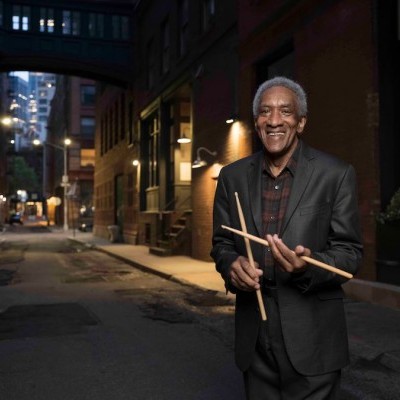
Foster was truly a drummer to the stars, including Miles Davis, Sonny Rollins and Joe Henderson.
Jun 3, 2025 11:25 AM
Al Foster, a drummer regarded for his fluency across the bebop, post-bop and funk/fusion lineages of jazz, died May 28…
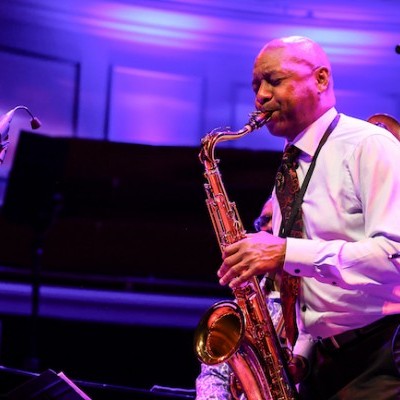
“Branford’s playing has steadily improved,” says younger brother Wynton Marsalis. “He’s just gotten more and more serious.”
May 20, 2025 11:58 AM
Branford Marsalis was on the road again. Coffee cup in hand, the saxophonist — sporting a gray hoodie and a look of…
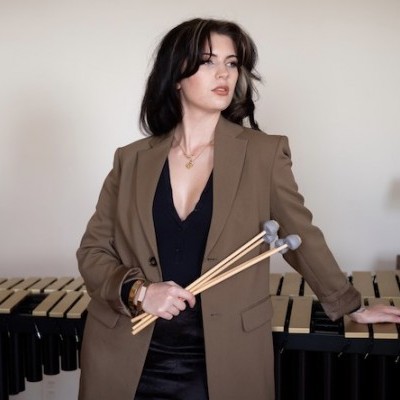
“What did I want more of when I was this age?” Sasha Berliner asks when she’s in her teaching mode.
May 13, 2025 12:39 PM
Part of the jazz vibraphone conversation since her late teens, Sasha Berliner has long come across as a fully formed…

Roscoe Mitchell will receive a Lifetime Achievement award at this year’s Vision Festival.
May 27, 2025 6:21 PM
Arts for Art has announced the full lineup for the 2025 Vision Festival, which will run June 2–7 at Roulette…
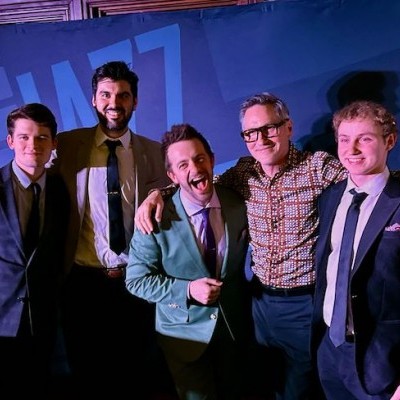
Benny Benack III and his quartet took the Midwest Jazz Collective’s route for a test run this spring.
Jun 3, 2025 10:31 AM
The time and labor required to tour is, for many musicians, daunting at best and prohibitive at worst. It’s hardly…